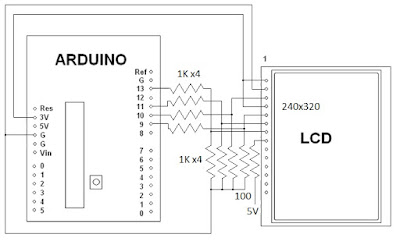I am using the Adafruit ILI9341 driver found at: https://github.com/adafruit/Adafruit_ILI9341
Note that the Adafruit LCD has level shifters for 5 volts built into it.
Here is a video of it working on Youtube.
Here is a video of the LCD being used as an oscilloscope.
Here are a couple of still pictures, only 6 of the 8 bits are connected for these pictures.
Here is the code for a more basic oscilloscope.
/************************************
2.8 SPI PIND TFT Oscope Simple
Reads the D0-D7 pins using PIND,
and shows the value on the screen.
Created 27 july 2015 by Bob Davis
**************************************/
//#include
#include
#include "Adafruit_ILI9341.h"
#include "Adafruit_GFX.h"
// pin definition for the Uno LCD
#define TFT_DC 9
#define TFT_CS 10
// Use hardware SPI (on Uno, #13=clk, #11=mosi) and the above for CS/DC
//Adafruit_ILI9341 tft = Adafruit_ILI9341(TFT_CS, TFT_DC);
Adafruit_ILI9341 tft = Adafruit_ILI9341();
//// set up variables
int Input=0;
byte Sample[320];
int trigger=64;
void setup(){
// initialize rotate and clear the display
tft.begin();
tft.fillScreen(ILI9341_BLACK);
tft.setRotation(1);
// Set the font size
tft.setTextSize(2);
// D input pins
pinMode(0, INPUT);
pinMode(1, INPUT);
pinMode(2, INPUT);
pinMode(3, INPUT);
pinMode(4, INPUT);
pinMode(5, INPUT);
pinMode(6, INPUT);
pinMode(7, INPUT);
}
void loop(){
// wait for a positive going trigger
for (int timeout=0; timeout < 1000; timeout++){
Input = PIND;
if (Input < trigger) break; }
for (int timeout=0; timeout < 1000; timeout++){
Input = PIND;
if (Input > trigger) break; }
// quickly collect the data with no delay
for (int xpos=0; xpos <320; xpos++){
Sample[xpos]=PIND;
// display the collected data
for (int xpos=0; xpos <319; xpos++){
// erase the old and draw new line
tft.drawLine(xpos+1, 0, xpos+1, 240, ILI9341_BLACK);
tft.drawLine(xpos, (Sample[xpos]*2), xpos+1, Sample[xpos+1]*2, ILI9341_WHITE);
}
}
// End of program
There is more info on the analog to digital converter at http://bobdavis321.blogspot.com/2015/06/arduino-5msps-oscilloscope-revisited.html



11 comments:
The 50% resistor divider you created provides 2.5V to the LCD powered at 3.3V.
Using 1K and 560 Ohm would be a much closer match (3.2V to the LCD) and the increased drive strength would allow you to run the LCD communications at higher speeds.
Using a 1K and a 2K resistor would also work. However the driver IC is actually rated to run on 2.5 volt or 3 volt logic so 2.5 volts works fine.
Hi, I used your schematic for my project and it works perfectly.
Than you !
http://yl4bs.blogspot.fr/2017/02/cheap-data-logger-v3-independent-data.html
Hai
At the pinmode. What should i put on the input? Or is it just a copy and paste and it should work fine?
that code makes no sense and is flooded with errors/typos
It is tricky to get code to display correctly on blogspot.
There is an extra "include" just delete it.
hello Bob,
i have rearranged my connections as per your drawing . Hope it solves my problem which is explanied below.
https://www.avrfreaks.net/forum/ili9341-tft-display-28-white-screen-issue
hello Bob,
i have rearranged my connections as per your drawing . Hope it solves my problem which is explanied below.
https://www.avrfreaks.net/forum/ili9341-tft-display-28-white-screen-issue
hello Bob,
i have rearranged my connections as per your drawing . Hope it solves my problem which is explanied below.
https://www.avrfreaks.net/forum/ili9341-tft-display-28-white-screen-issue
I read your whole content it’s really interesting and attracting for new reader.
Thanks for sharing the information with us.
1.8inch lcd display screen in Germany
1.77inch tft display screen in USA
1.3inch lcd display screen in Poland
2.4inch lcd display in Poland
2.8inch tft module in Germany
4.3inch lcd display screen in France
2.4 inch TFT Display
Post a Comment